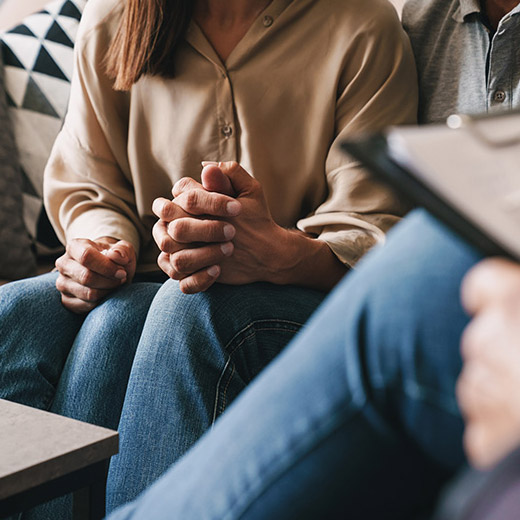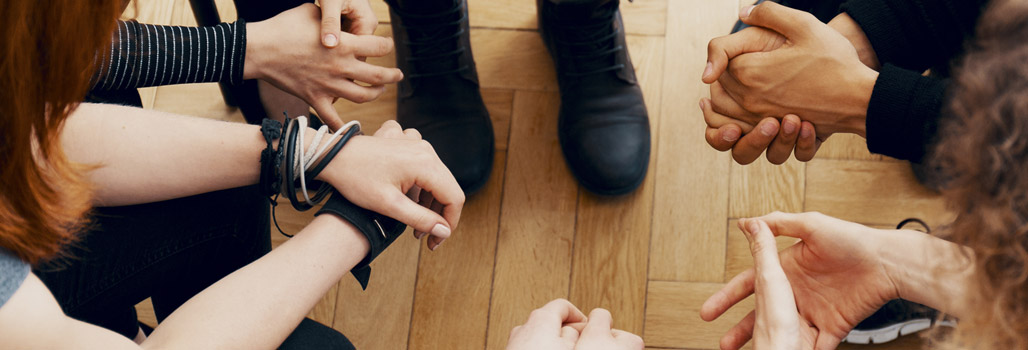What Is Opiate Addiction?
Addiction to opiates like codeine and morphine is a growing social problem that has been normalized by the over-prescription of painkillers. Many people suffering from chronic pain as well as those prescribed analgesics after trauma and surgeries have fallen into the trap of addiction unintentionally. If you have been abusing opiates to feel better from physical or emotional pain, you are not alone. It is possible to live a pain-free life without opiates with the right professional help. By reaching out for help, you can be weaned off opiates without the negative side effects of withdrawal and enjoy a better quality of life. When you are ready, we will be there to support you.


Opiate Addiction Symptoms
Codeine is prescribed for diarrhea, coughing, and mild to moderate pain but it is abused for its calming effects. It is not as addictive as morphine but it is habit-forming. Increased tolerance to codeine can make it ineffective and you may switch to morphine, which is intended for the treatment of severe pain.
The symptoms of opiate addiction affect your physical body, mood and behaviors. They slow down your breathing and heart rate and lower your blood pressure. Opiate addiction can cause headaches, joint and muscle pain, and increased sensitivity to pain.
Users may be drowsy and have slurred speech as well as loss of coordination. Long-term opiate abuse causes stomach pain, nausea and constipation. Dry eyes and mouth as well as clamminess in your hands and feet are common. Appetite and weight loss may occur.
Short-term use can block anxiety and induces feelings of calmness and euphoria. Opiates affect your memory and concentration span. They can cause loss of motivation and depression.
Defining Opiates
Opiates are natural extractions of the poppy plant. Also known as narcotics, they are used for pain relief, anesthesia and in the case of codeine, as a cough suppressant. If you are addicted to opiates you probably started using them as a prescription but if they are used over the long term, they become habit-forming and addictive.
Natural derivatives of the poppy plant
Opiates are naturally occurring. They are extracted from the opium found in the seeds of the poppy plant. They act on opiate receptors in the brain, spinal cord and other parts of your body. As a result, they can block emotional and physical pain from being experienced.
Narcotic
Opiates are narcotics, which is derived from the word narcosis, which means sleep state. They induce feelings of calmness but abusing them can lead to drowsiness and slurred speech patterns as well as loss of coordination.
Analgesic3
Opiates are analgesics which means they numb pain. Morphine is an opiate used for the management of severe pain, during surgical procedures, and for patients suffering from terminal diseases like cancer. Over time, an opiate addiction causes you to become more sensitive to pain, and people suffering start abusing stronger opioids to manage their conditions.
The Dangers of Opiates Addiction
When you become addicted to opiates you develop tolerance so they no longer work and can cause you to feel pain more intensely. Over time they can cause muscle spasms and joint pain. Opiates are central nervous system depressants and they slow down breathing, which can lead to respiratory failure. Opiates are extremely dangerous when you combine them with other depressants like alcohol and benzodiazepines.
Injecting opiates like morphine can cause collapsed veins. Prolonged use can cause organ damage to your kidneys and liver, as well as to your brain. Using them over the long term can depress your immune system and make you more susceptible to infectious diseases. An opiate addiction also affects your mental health. It can exacerbate underlying mental health disorders, leading to delusions, hallucinations, and paranoia. Once the effects of the opiate wear off, negative emotions return.
What Is the Difference between Opiate Addiction and Abuse?
If you abuse opiates you might take more than prescribed or use them for longer than instructed by your doctor. The reason that they are prescribed for short-term use only is because of their high potential for addiction. When you are in the stages of abuse, you still have some control over your consumption. Once you become addicted, you lose that ability to control it and develop an increased tolerance that affects you physically, emotionally, and behaviorally. You need to use more to achieve the same euphoria, or you might start injecting it to feel the effects. You might switch to a stronger, more dangerous opioid in order to feel as though you are functioning normally.

Opiate Addictions We Treat
We treat the following opiate addictions:
- Methadone rehab
- Fentanyl rehab
- Hydrocodone rehab
- Oxycodone rehab
- Codeine rehab
- And many others.
Detox Program
Detoxification will help you cleanse your body from any harmful substances. Even if you have been using multiple drugs or have been abusing alcohol in addition to your opiate use, we can help you sober up and be ready for the rehab phase.
Residential Program
The residential rehab phase comes after detoxification. During this period, you will attend therapy, counseling sessions and participate in group therapies. We will create a unique, tailored treatment schedule for you so that your individual situation can be best-managed and handled. We believe in you!
Extended Rehab Program
Extended rehab usually means our aftercare and Alumni programs. We offer you counseling and therapy for a period after you complete your rehab with us. Free of charge as part of your recovery. In addition, we have an Alumni network that will help you find like-minded individuals and feel in the right place during your return to everyday tasks and responsibilities.
Do You Need Help?
Together, we can build up your confidence and you can regain control over your life!
Contact us now to ask about our addiction and abuse treatment programs now!
How Opiates Affect Us
Each person has a unique genetic make up, which influences how we metabolize opiates. Variables like your age, weight, mental and physical health, co-occurring disorders, and the type of potency of opiate all impact the way they affect you.
Physiological effects
Opiates have a depressant effect on your body. They slow your heart rate and breathing and lower your blood pressure. They block feelings of pain by binding to the receptors that provide natural pain relief. When you become addicted, your brain stops producing its own. When they bind to the opioid receptors in your gut they cause nausea, vomiting, constipation, and bowel dysfunction. Their sedative effects can cause dizziness and loss of coordination.
Psychological effects
When you first start taking them, opiates induce feelings of warmth, calmness, euphoria, and pleasure. They decrease your alertness and induce sleep. Because of the changes opiates make to your reward center, negative feelings rebound when their effects wear off. Over time, they can cause anxiety and agitation as well as severe and long-lasting depression. Loss of motivation, mood swings and brain fog are commonly experienced. They cause you to develop progressive tolerance which can lead to addiction.
Crime-related statistics
Opiate users have higher rates of criminal offenses than many other drugs. Reoffenses among opiate users are common, particularly among females. Opiate users are more likely to commit crimes for financial gain, in order to fund their substance use. Opiate use has also been found to motivate criminals with criminal records to re-offend, with theft and burglaries the most common offenses committed.
How Does Opiate Addiction Affect My Family?
It is really difficult for family members to see someone they care about in pain and struggling with an opiate addiction. Your loved ones may want to help but might not know how to approach you or what they can do. Your mood swings and outbursts can cause hurt to your friends and family, who may not understand how you feel or what you are going through.
Parents of teens and children with opiate addictions worry about their children, where they are, and who they are with. Their stress can cause marital problems and disagreements with their child, pushing him or her away instead of pulling the child closer. When a child grows up with an addicted parent the child is forced to act like an adult while his or her own developmental needs are not met. reaching out for help will benefit you and the people close o you. It will give you a chance to rebuild bonds and reconnect with the people who matter.

Opiate Overdose
Opiate overdose has been described as a national crisis and overdose deaths have been increasing over the last ten years. Overdoses occur most frequently when you take a large dose (such as during a relapse) or when the opiate is mixed with another depressant like alcohol. An overdose can be fatal and you must seek immediate treatment. Medication is available to reverse an opiate overdose but it must be administered quickly.
About Our Opiate Addiction Treatment Center
Our luxury rehab center is well equipped to help you recover from opiate addiction. Our experienced and welcoming clinical staff can assist you with a tapering schedule to reduce your dependence so you can focus on healing and moving forward. An opiate addiction is a complex disease that requires a tailored approach for each client. By staying in our distraction-free environment, you can work through the underlying issues that contributed to your addiction and learn healthy coping skills for your future.
Learn More About Our Aftercare Program

Why Choose United Recovery CA for Opiate Addiction Treatment?
- We offer long-term rehabilitation to help with opiate treatment and recovery.
- We provide monitored detox
- We offer both inpatient and outpatient services
- Our therapies include individual and group addiction treatment
- We provide a safe, caring, and non-judgmental environment









